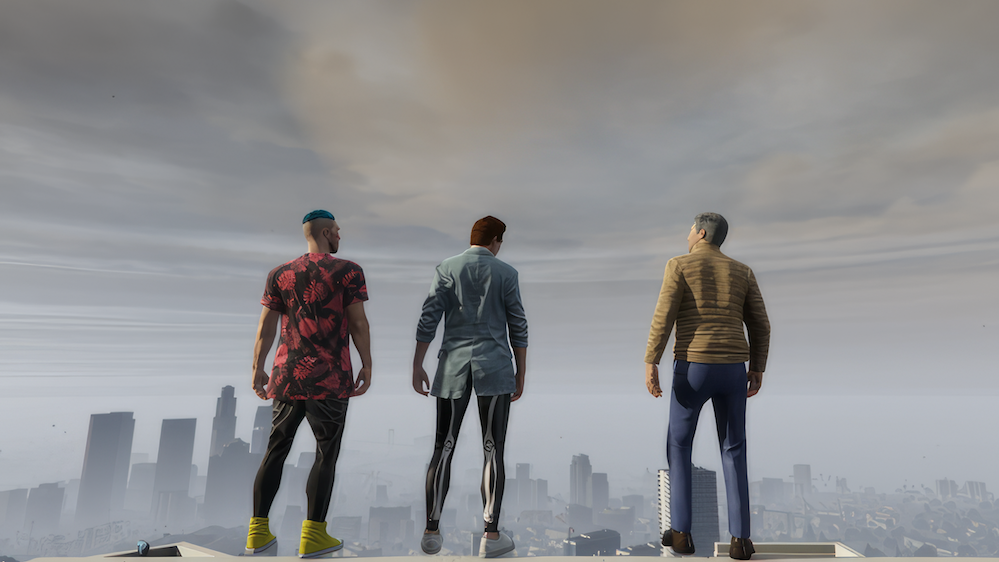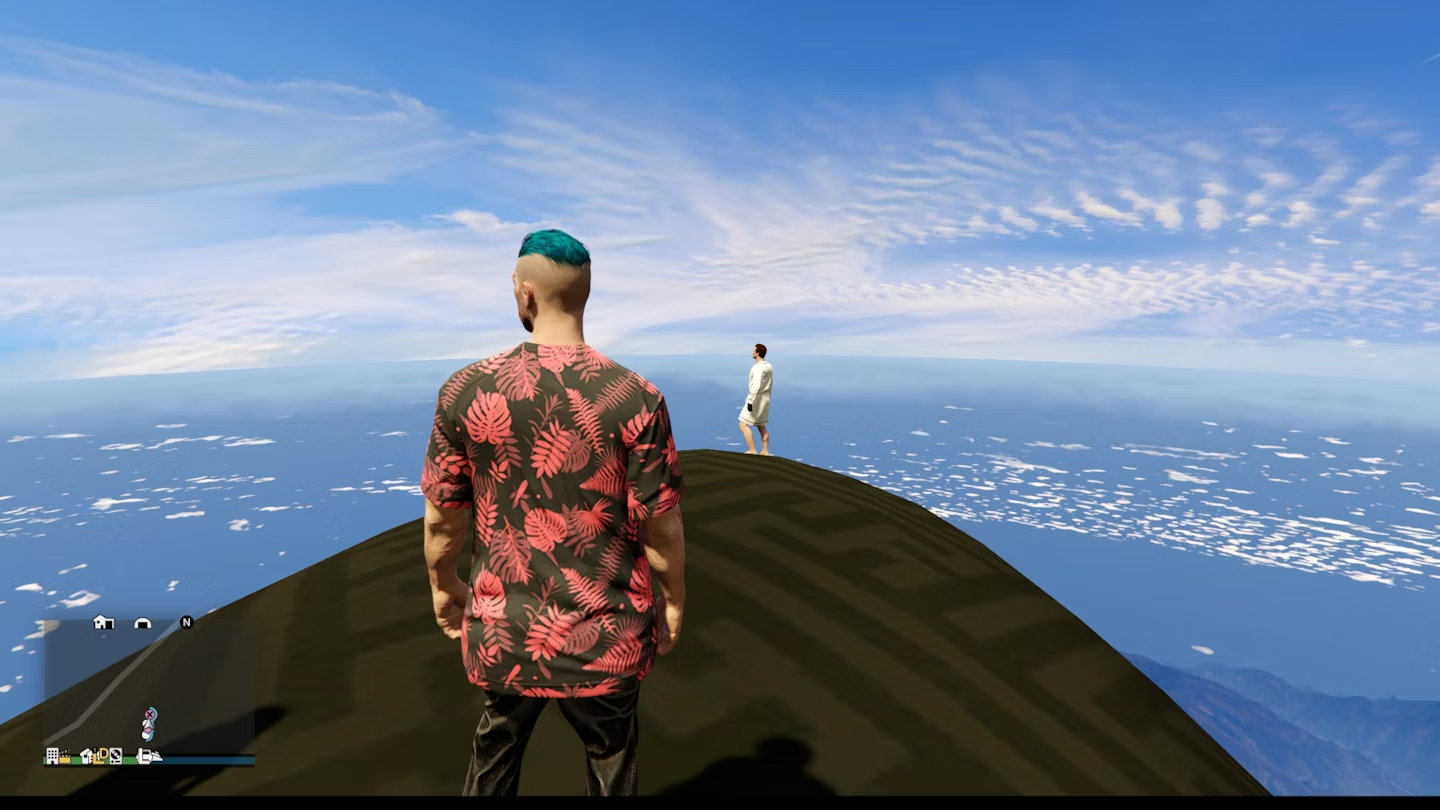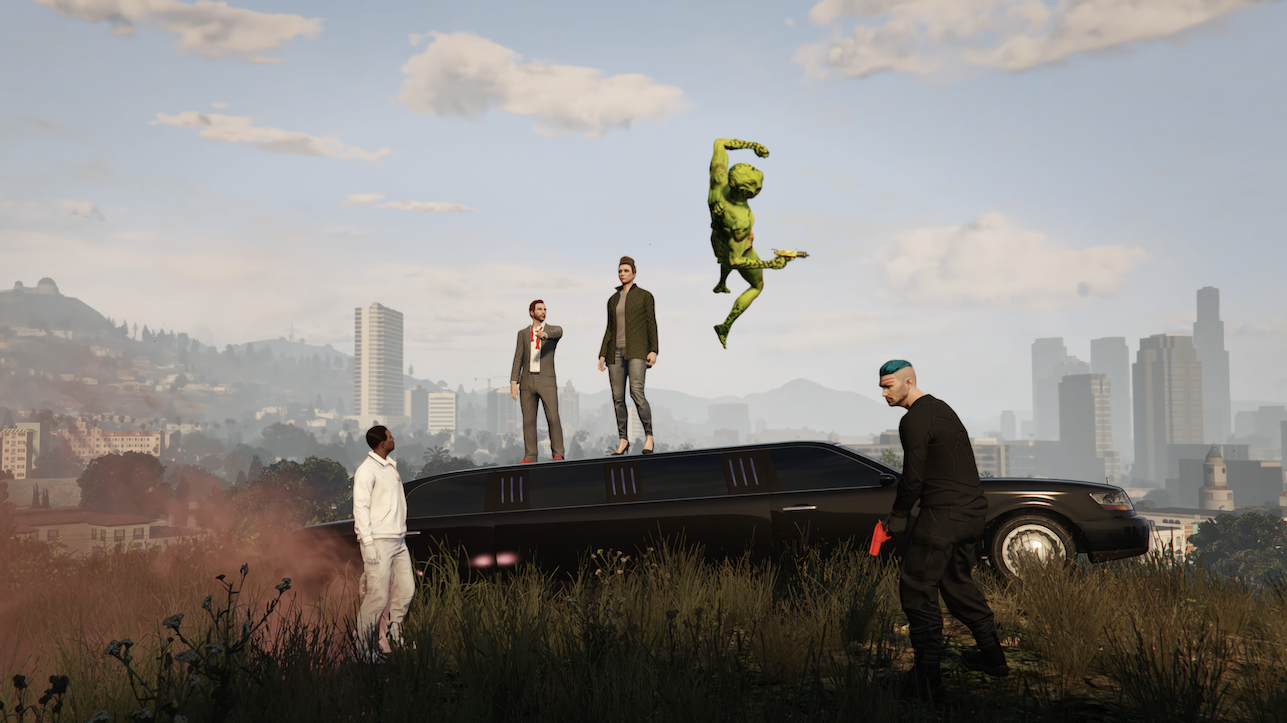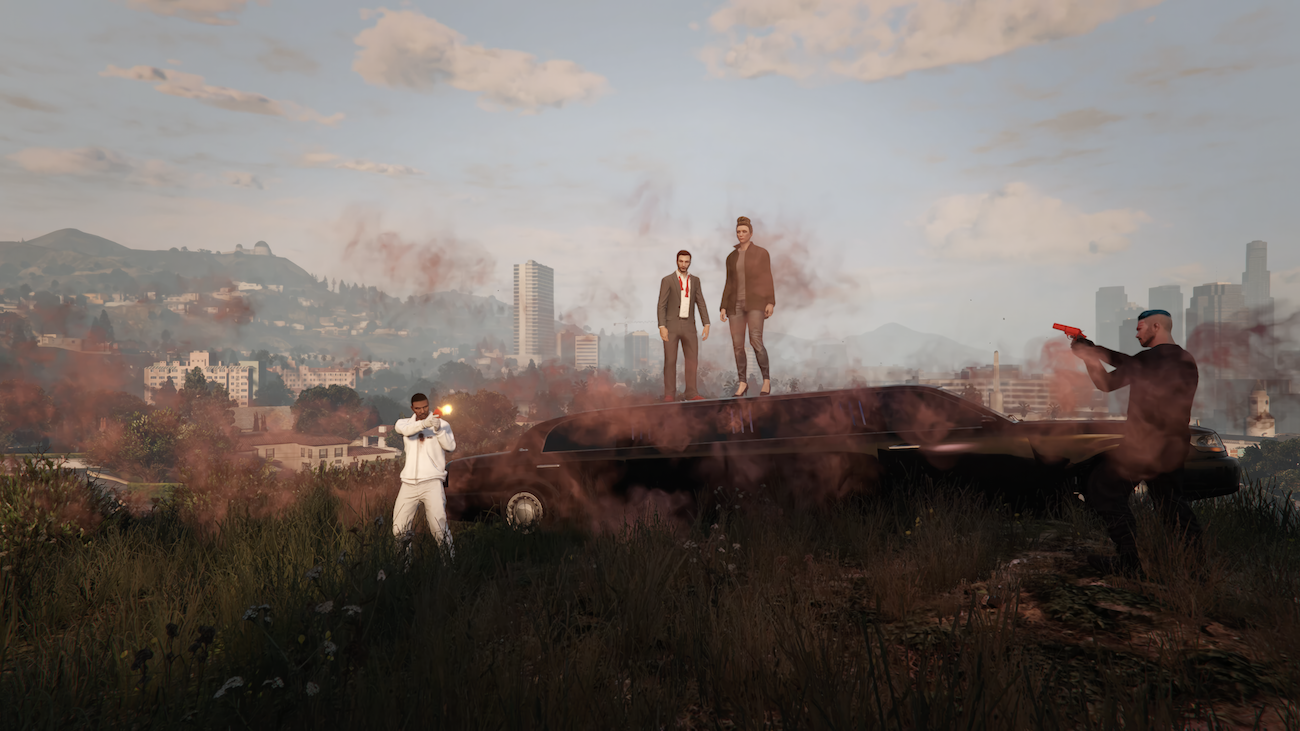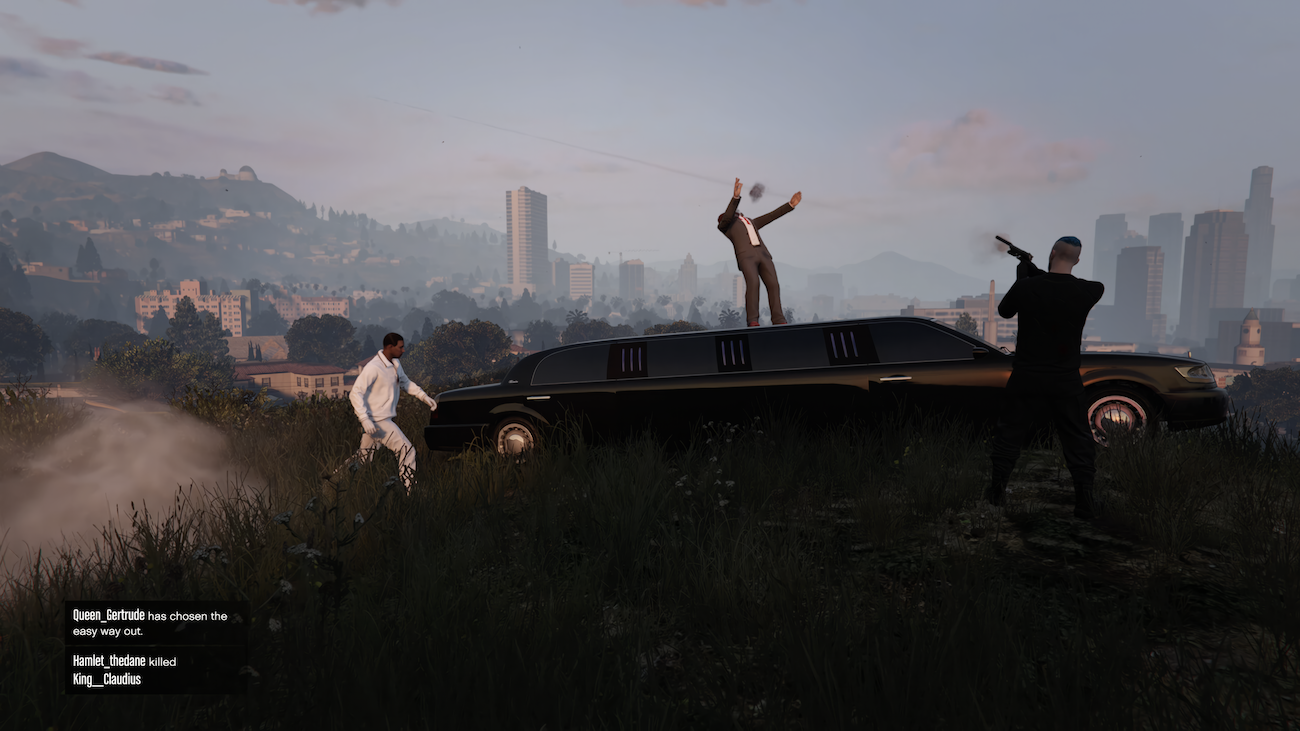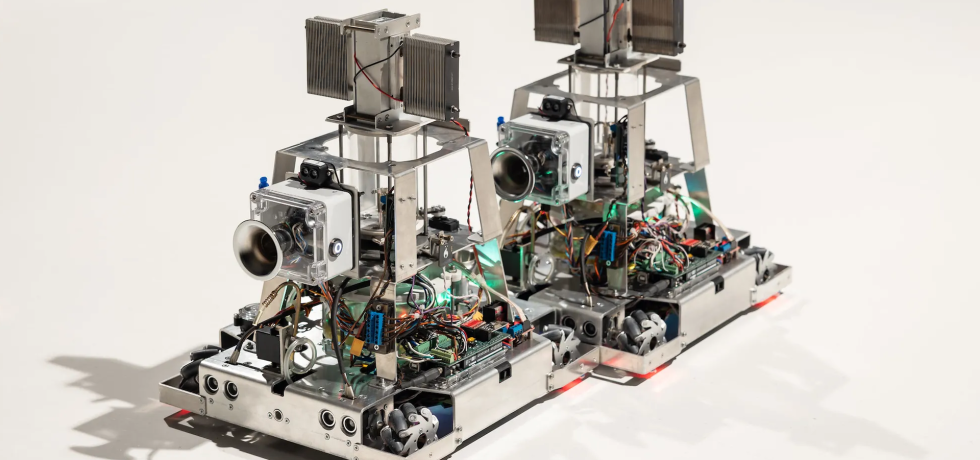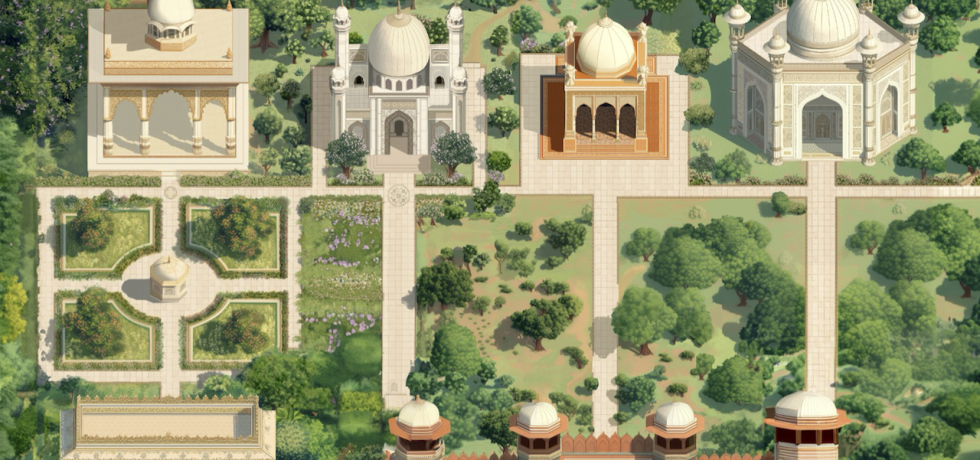Grand Theft Hamlet
“It was surreal. I went from this very niche, intellectual fringe show straight into rehearsals for this massive West End production, and then, one week later, it was gone. Everything shut down. That was the moment it really hit us.”
—Sam Crane
January 2021: The UK is in its third lockdown and all entertainment venues remain closed. For theatre actors Sam Crane and Mark Oosterveen, the future looks bleak. As the pandemic drags on, Mark — single and childless — is increasingly socially isolated, while Sam panics about how he is going to support his young family. They spend their days in the online digital world of Grand Theft Auto, and when they stumble across a theatre, they suddenly have an idea to stage a ful production of Hamlet within the game. Sam’s wife, documentary filmmaker Pinny Grylls, steps into the game as an avatar filmmaker to record their journey.
Written and directed by Pinny Grylls and Sam Crane, this feature documentary debut is about two out-of-work actors attempting the impossible task of mounting a full production of William Shakespeare’s Hamlet inside the ultra-violent world of Grand Theft Auto. Shot entirely in-game, the film charts their ridiculous, hilarious and moving adventure as they battle violent griefers and discover surprising truths about life, friendship and the enduring power of Shakespeare.
Sam is a theater actor, Pinny a documentary filmmaker. Both were working freelance, enjoying creative freedom despite financial instability. “It was a happy life, really,” says Pinny. “Always a bit of a financial struggle as freelancers, but there was joy in the work. And then, of course, the pandemic hit.”
Sam had just performed a solo experimental show exploring identity before the pandemic began—“a very complex one-person show, written by this brilliant Uruguayan playwright, Sergio Blanco. I was playing a version of him, but also a version of me. It was this strange rabbit hole of identity and performance, and we were just starting to build momentum when audiences began to disappear—until I was performing for three people a night.” He had just started rehearsals for Harry Potter and the Cursed Child before lockdown shut it all down.
Pinny was commissioned to document daily life during lockdown. “I’d never filmed myself—or Sam—before. But Ipsos MORI asked me to start documenting our life during the lockdown, just us at home. That experience was foundational. It made us comfortable being on camera, talking about ourselves, even when we didn’t realize how that would shape our future work.”
Meanwhile, the British government’s lack of support left them vulnerable. Sam: “As freelancers, we weren’t included in the furlough scheme. We were incredibly vulnerable. When support finally came through, it wasn’t much—but it covered the mortgage, and more importantly, it gave us room to breathe. That space allowed us to play, to experiment.”
Then their son introduced them to Minecraft roleplay streams, leading to a deep curiosity about gaming culture. Pinny: “He was watching Dream, this Minecraft streamer, and explaining to us how people were roleplaying entire soap operas inside a game. Thousands of people were watching these live events online, and it blew our minds. Suddenly, this world we knew nothing about felt like a new canvas.”
Sam dove into Grand Theft Auto roleplay, reaching out to his friend to explore. “I messaged Mark and said, ‘Do you want to just hang out in the game and see what happens?’ I had no plan—it was just curiosity. But almost instantly, I saw the potential. I didn’t realize people were building whole characters and performances in these spaces.”
The project evolved naturally from play to pitch, starting with viral Shakespeare videos inside GTA. “At first, it was just me experimenting—trying out Shakespeare monologues in the middle of this chaotic game world. I uploaded a few clips and, to our surprise, they started to take off. The press noticed. It felt like we were prototyping in public, before we even realized what it was becoming.”
But it was winning the Critics’ Choice award at the Milan Machinima Festival that validated the project. “We submitted a ten-minute short, made entirely in GTA, to the machinima festival just to see what would happen. And then it won Critics’ Choice. That gave us the confidence to keep going. It felt like we were finally tapping into something bigger.”
Along the way they were influenced by artists who had embraced the chaos of gaming. Sam again: “Watching Eddo Stern’s Freedom, made in Counter-Strike, was a lightbulb moment. It was just carnage—raw, unscripted, and hilarious. It taught me that you don’t have to control everything. Let the chaos in. That’s where the life is.”
Pinny: “What I love about documentary is the randomness—and Sam loves live theater for the same reason. With gaming, we found this new medium that shares that liveness: other players, unpredictability, spontaneity. We weren’t gamers. We didn’t know what we couldn’t do. That turned out to be our superpower.”
 Pinny Grylls is an award-winning documentary filmmaker and ethnographer. Her debut short documentary Peter and Ben premiered at IDFA DocFest. She has since made documentaries for Channel 4 (Who Do You Think You Were?), The Guardian (Thank You Women), BBC/National Theatre (The Hour) and The Royal Opera House (Becoming Zerlina). Grand Theft Hamlet, her debut feature documentary, was co-directed with her partner, Sam Crane. Their attempt to stage a live performance of Hamlet inside Grand Theft Auto won a Stage Innovation Award. The film won the SXSW Jury Award for Best Feature Doc in 2024 and was screened at Hot Docs in Toronto, Visions du Réel in Switzerland and CPHDox in Copenhagen. Pinny received the BFI & Chanel Luminous Gala Filmmaker Award 2024. The BFI is currently supporting her to develop a fiction feature, Hear My Voice, about a boy who dreams of being an opera singer and his relationship with his deaf father. Pinny has been deaf/hard of hearing since 2016 and is now a sign-language user and lip reader.
Pinny Grylls is an award-winning documentary filmmaker and ethnographer. Her debut short documentary Peter and Ben premiered at IDFA DocFest. She has since made documentaries for Channel 4 (Who Do You Think You Were?), The Guardian (Thank You Women), BBC/National Theatre (The Hour) and The Royal Opera House (Becoming Zerlina). Grand Theft Hamlet, her debut feature documentary, was co-directed with her partner, Sam Crane. Their attempt to stage a live performance of Hamlet inside Grand Theft Auto won a Stage Innovation Award. The film won the SXSW Jury Award for Best Feature Doc in 2024 and was screened at Hot Docs in Toronto, Visions du Réel in Switzerland and CPHDox in Copenhagen. Pinny received the BFI & Chanel Luminous Gala Filmmaker Award 2024. The BFI is currently supporting her to develop a fiction feature, Hear My Voice, about a boy who dreams of being an opera singer and his relationship with his deaf father. Pinny has been deaf/hard of hearing since 2016 and is now a sign-language user and lip reader.
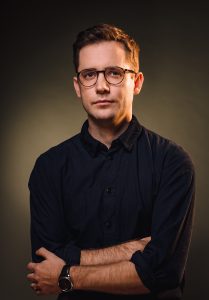 Sam Crane is an award-winning filmmaker, video artist and actor. His short machinima film We Are Such Stuff as Dreams Are Made On won Critics Choice at the Milan Machinima Festival and Best Video Art at the Athens Digital Arts Festival and was shortlisted for the Lumen Prize. He has performed onstage at the National Theatre and Shakespeare’s Globe in London, in the West End and on Broadway, working with such celebrated theater artists as Sir Mark Rylance, Katie Mitchell and Robert Icke. He is also a prolific screen actor, having appeared in such films and television shows as Napoleon, The Crown, Transatlantic, The Trial of Christine Keeler, Poldark, and Call The Midwife. He recently finished shooting The Deal, a six-part drama series about the Iran nuclear deal. He is also a Ph.D. candidate at the University of York’s School of Arts and Creative Technologies, doing autoethnographic research in performance practice in real and digital spaces.
Sam Crane is an award-winning filmmaker, video artist and actor. His short machinima film We Are Such Stuff as Dreams Are Made On won Critics Choice at the Milan Machinima Festival and Best Video Art at the Athens Digital Arts Festival and was shortlisted for the Lumen Prize. He has performed onstage at the National Theatre and Shakespeare’s Globe in London, in the West End and on Broadway, working with such celebrated theater artists as Sir Mark Rylance, Katie Mitchell and Robert Icke. He is also a prolific screen actor, having appeared in such films and television shows as Napoleon, The Crown, Transatlantic, The Trial of Christine Keeler, Poldark, and Call The Midwife. He recently finished shooting The Deal, a six-part drama series about the Iran nuclear deal. He is also a Ph.D. candidate at the University of York’s School of Arts and Creative Technologies, doing autoethnographic research in performance practice in real and digital spaces.
IN THE MEDIA
“It’s fair to say that William Shakespeare’s Hamlet and Grand Theft Auto wouldn’t appear to be likely bedfellows, at least on face value. One is a text that has been adapted and studied for centuries, with everyone from Kenneth Branagh to the Simpsons taking a stab at it. The other is the biggest and arguably most controversial video game franchise in the world, having been brought to life in 1997 by the Scottish game developers at Rockstar North. Gamers are essentially free to do anything they want in its expansive open world, including untold amounts of chaos and crimes. And even, as recounted in a new documentary, putting on a production of Hamlet itself.”—The Independent
“Of all the pieces of art to have emerged from lockdown, we can say with confidence that Sam Crane and Pinny Grylls’ Grand Theft Hamlet — a surreal documentary in which two out of work actors mount a production of Shakespeare’s greatest tragedy in the ultraviolent virtual world of Grand Theft Auto Online — is easily the funniest. It also, more unexpectedly, may be one of the most cathartic, too. . . .
“Lurking beneath the herky-jerky gameplay hijinks, unexpected twists and turns, and spontaneous acts of extreme violence, is an unexpectedly moving, genuinely quite revolutionary tribute to art’s endurance — and importance — in times of crisis. This is, after all, the chronicle of two men’s refusal to let the shuttering of theatre doors become the curtain call on their craft and on its capacity to reach across the then-all-too-literal divide to bring people together, to offer some light and escape in a time of darkness and oppressive restriction. As Crane so eloquently puts it while fleeing a convoy of police helicopters and heavily armed lawmen, ‘You can’t stop art, motherfuckers!’”
—Empire
“This is not the ideal setting for players to use their avatars to stage a Shakespeare play. Or is it? As one participant points out, there’s a lot of death and dying and bad behavior in Shakespeare. . . . The film is pretty funny, in part because Grand Theft Auto is set up for killing, and random people . . . can wander through and shoot someone without malice or forethought. Life is cheap and death is a constant (you can, apparently, resurrect fairly swiftly), which takes on a grim humor when you remember the reason for the lockdown in the first place.
“But Grand Theft Hamlet is really about a number of other themes: artistic obsession, community, and, I think most important, what constitutes “real” life in a world pervaded by digital existences. [It] challenges conceptions of what online platforms and games really represent to players, especially those who find themselves alienated, rejected or just prevented from participating in the flesh-and-blood world that documentaries usually capture. . . . It’s surprisingly moving, more a testament to the human drive toward community and connection in even the most unexpected of spaces.”
—The New York Times
“A brilliant idea, brilliantly executed; hilarious, surreal and, yes, in its weird way, genuinely exciting. This could be a Marat/Sade for the 21st century. . . . Crane and Oosterveen, with Pinny Grylls (who directs along with Crane), reflect absorbingly on the endless, bleak violence of the game, how close it is to the violence of Shakespeare’s world and how depressed they are due to the stasis of lockdown; it adds up to a new dreamlike insight into Hamlet’s melancholy.
—The Guardian
